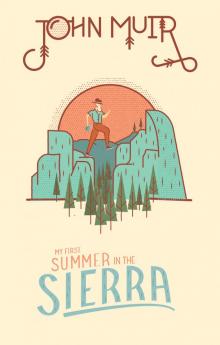My First Summer in the Sierra Read online
Page 8
If only one could be got to cross over, all would make haste to follow; but that one could not be found. A lamb was caught, carried across, and tied to a bush on the opposite bank, where it cried piteously for its mother. But though greatly concerned, the mother only called it back. That play on maternal affection failed, and we began to fear that we should be forced to make a long roundabout drive and cross the wide-spread tributaries of the creek in succession. This would require several days, but it had its advantages, for I was eager to see the sources of so famous a stream. Don Quixote, however, determined that they must ford just here, and immediately began a sort of siege by cutting down slender pines on the bank and building a corral barely large enough to hold the flock when well pressed together. And as the stream would form one side of the corral he believed that they could easily be forced into the water.
In a few hours the inclosure was completed, and the silly animals were driven in and rammed hard against the brink of the ford. Then the Don, forcing a way through the compacted mass, pitched a few of the terrified unfortunates into the stream by main strength; but instead of crossing over, they swam about close to the bank, making desperate attempts to get back into the flock. Then a dozen or more were shoved off, and the Don, tall like a crane and a good natural wader, jumped in after them, seized a struggling wether, and dragged it to the opposite shore. But no sooner did he let it go than it jumped into the stream and swam back to its frightened companions in the corral, thus manifesting sheep-nature as unchangeable as gravitation. Pan with his pipes would have had no better luck, I fear. We were now pretty well baffled. The silly creatures would suffer any sort of death rather than cross that stream. Calling a council, the dripping Don declared that starvation was now the only likely scheme to try, and that we might as well camp here in comfort and let the besieged flock grow hungry and cool, and come to their senses, if they had any. In a few minutes after being thus let alone, an adventurer in the foremost rank plunged in and swam bravely to the farther shore. Then suddenly all rushed in pell-mell together, trampling one another under water, while we vainly tried to hold them back. The Don jumped into the thickest of the gasping, gurgling, drowning mass, and shoved them right and left as if each sheep was a piece of floating timber. The current also served to drift them apart; a long bent column was soon formed, and in a few minutes all were over and began baaing and feeding as if nothing out of the common had happened. That none were drowned seems wonderful. I fully expected that hundreds would gain the romantic fate of being swept into Yosemite over the highest waterfall in the world.
As the day was far spent, we camped a little way back from the ford, and let the dripping flock scatter and feed until sundown. The wool is dry now, and calm, cud-chewing peace has fallen on all the comfortable band, leaving no trace of the watery battle. I have seen fish driven out of the water with less ado than was made in driving these animals into it. Sheep brain must surely be poor stuff. Compare today’s exhibition with the performances of deer swimming quietly across broad and rapid rivers, and from island to island in seas and lakes; or with dogs, or even with the squirrels that, as the story goes, cross the Mississippi River on selected chips, with tails for sails comfortably trimmed to the breeze. A sheep can hardly be called an animal; an entire flock is required to make one foolish individual.
The Yosemite
July 15. Followed the Mono Trail up the eastern rim of the basin nearly to its summit, then turned off southward to a small shallow valley that extends to the edge of the Yosemite, which we reached about noon, and encamped. After luncheon I made haste to high ground, and from the top of the ridge on the west side of Indian Cañon gained the noblest view of the summit peaks I have ever yet enjoyed. Nearly all the upper basin of the Merced was displayed, with its sublime domes and cañons, dark upsweeping forests, and glorious array of white peaks deep in the sky, every feature glowing, radiating beauty that pours into our flesh and bones like heat rays from fire. Sunshine over all; no breath of wind to stir the brooding calm. Never before had I seen so glorious a landscape, so boundless an affluence of sublime mountain beauty. The most extravagant description I might give of this view to any one who has not seen similar landscapes with his own eyes would not so much as hint its grandeur and the spiritual glow that covered it. I shouted and gesticulated in a wild burst of ecstasy, much to the astonishment of St. Bernard Carlo, who came running up to me, manifesting in his intelligent eyes a puzzled concern that was very ludicrous, which had the effect of bringing me to my senses. A brown bear, too, it would seem, had been a spectator of the show I had made of myself, for I had gone but a few yards when I started one from a thicket of brush. He evidently considered me dangerous, for he ran away very fast, tumbling over the tops of the tangled manzanita bushes in his haste. Carlo drew back, with his ears depressed as if afraid, and kept looking me in the face, as if expecting me to pursue and shoot, for he had seen many a bear battle in his day.
Following the ridge, which made a gradual descent to the south, I came at length to the brow of that massive cliff that stands between Indian Cañon and Yosemite Falls, and here the far-famed valley came suddenly into view throughout almost its whole extent. The noble walls—sculptured into endless variety of domes and gables, spires and battlements and plain mural precipices—all a-tremble with the thunder tones of the falling water. The level bottom seemed to be dressed like a garden—sunny meadows here and there, and groves of pine and oak; the river of Mercy sweeping in majesty through the midst of them and flashing back the sunbeams. The great Tissiack, or Half-Dome, rising at the upper end of the valley to a height of nearly a mile, is nobly proportioned and life-like, the most impressive of all the rocks, holding the eye in devout admiration, calling it back again and again from falls or meadows, or even the mountains beyond,—marvelous cliffs, marvelous in sheer dizzy depth and sculpture, types of endurance. Thousands of years have they stood in the sky exposed to rain, snow, frost, earthquake and avalanche, yet they still wear the bloom of youth.
I rambled along the valley rim to the westward; most of it is rounded off on the very brink, so that it is not easy to find places where one may look clear down the face of the wall to the bottom. When such places were found, and I had cautiously set my feet and drawn my body erect, I could not help fearing a little that the rock might split off and let me down, and what a down!—more than three thousand feet. Still my limbs did not tremble, nor did I feel the least uncertainty as to the reliance to be placed on them. My only fear was that a flake of the granite, which in some places showed joints more or less open and running parallel with the face of the cliff, might give way. After withdrawing from such places, excited with the view I had got, I would say to myself, “Now don’t go out on the verge again.” But in the face of Yosemite scenery cautious remonstrance is vain; under its spell one’s body seems to go where it likes with a will over which we seem to have scarce any control.
After a mile or so of this memorable cliff work I approached Yosemite Creek, admiring its easy, graceful, confident gestures as it comes bravely forward in its narrow channel, singing the last of its mountain songs on its way to its fate—a few rods more over the shining granite, then down half a mile in showy foam to another world, to be lost in the Merced, where climate, vegetation, inhabitants, all are different. Emerging from its last gorge, it glides in wide lace-like rapids down a smooth incline into a pool where it seems to rest and compose its gray, agitated waters before taking the grand plunge, then slowly slipping over the lip of the pool basin, it descends another glossy slope with rapidly accelerated speed to the brink of the tremendous cliff, and with sublime, fateful confidence springs out free in the air.
I took off my shoes and stockings and worked my way cautiously down alongside the rushing flood, keeping my feet and hands pressed firmly on the polished rock. The booming, roaring water, rushing past close to my head, was very exciting. I had expected that the sloping apron would terminate with the perpendicular wall of the valley, and that fr
om the foot of it, where it is less steeply inclined, I should be able to lean far enough out to see the forms and behavior of the fall all the way down to the bottom. But I found that there was yet another small brow over which I could not see, and which appeared to be too steep for mortal feet. Scanning it keenly, I discovered a narrow shelf about three inches wide on the very brink, just wide enough for a rest for one’s heels. But there seemed to be no way of reaching it over so steep a brow. At length, after careful scrutiny of the surface, I found an irregular edge of a flake of the rock some distance back from the margin of the torrent. If I was to get down to the brink at all that rough edge, which might offer slight finger-holds, was the only way. But the slope beside it looked dangerously smooth and steep, and the swift roaring flood beneath, overhead, and beside me was very nerve-trying. I therefore concluded not to venture farther, but did nevertheless. Tufts of artemisia were growing in clefts of the rock near by, and I filled my mouth with the bitter leaves, hoping they might help to prevent giddiness. Then, with a caution not known in ordinary circumstances, I crept down safely to the little ledge, got my heels well planted on it, then shuffled in a horizontal direction twenty or thirty feet until close to the outplunging current, which, by the time it had descended thus far, was already white. Here I obtained a perfectly free view down into the heart of the snowy, chanting throng of comet-like streamers, into which the body of the fall soon separates.
While perched on that narrow niche I was not distinctly conscious of danger. The tremendous grandeur of the fall in form and sound and motion, acting at close range, smothered the sense of fear, and in such places one’s body takes keen care for safety on its own account. How long I remained down there, or how I returned, I can hardly tell. Anyhow I had a glorious time, and got back to camp about dark, enjoying triumphant exhilaration soon followed by dull weariness. Hereafter I’ll try to keep from such extravagant, nerve-straining places. Yet such a day is well worth venturing for. My first view of the High Sierra, first view looking down into Yosemite, the death song of Yosemite Creek, and its flight over the vast cliff, each one of these is of itself enough for a great life-long landscape fortune—a most memorable day of days—enjoyment enough to kill if that were possible.
July 16. My enjoyments yesterday afternoon, especially at the head of the fall, were too great for good sleep. Kept starting up last night in a nervous tremor, half awake, fancying that the foundation of the mountain we were camped on had given way and was falling into Yosemite Valley. In vain I roused myself to make a new beginning for sound sleep. The nerve strain had been too great, and again and again I dreamed I was rushing through the air above a glorious avalanche of water and rocks. One time, springing to my feet, I said, “This time it is real—all must die, and where could mountaineer find a more glorious death!”
Left camp soon after sunrise for an all-day ramble eastward. Crossed the head of Indian Basin, forested with Abies magnifica, underbrush mostly Ceanothus cordulatus and manzanita, a mixture not easily trampled over or penetrated, for the ceanothus is thorny and grows in dense snow-pressed masses, and the manzanita has exceedingly crooked, stubborn branches. From the head of the cañon continued on past North Dome into the basin of Dome or Porcupine Creek. Here are many fine meadows imbedded in the woods, gay with Lilium parvum and its companions; the elevation, about eight thousand feet, seems to be best suited for it—saw specimens that were a foot or two higher than my head. Had more magnificent views of the upper mountains, and of the great South Dome, said to be the grandest rock in the world. Well it may be, since it is of such noble dimensions and sculpture. A wonderfully impressive monument, its lines exquisite in fineness, and though sublime in size, is finished like the finest work of art, and seems to be alive.
July 17. A new camp was made to-day in a magnificent silver fir grove at the head of a small stream that flows into Yosemite by way of Indian Cañon. Here we intend to stay several weeks,—a fine location from which to make excursions about the great valley and its fountains. Glorious days I’ll have sketching, pressing plants, studying the wonderful topography and the wild animals, our happy fellow mortals and neighbors. But the vast mountains in the distance, shall I ever know them, shall I be allowed to enter into their midst and dwell with them?
We were pelted about noon by a short, heavy rainstorm, sublime thunder reverberating among the mountains and cañons,—some strokes near, crashing, ringing in the tense crisp air with startling keenness, while the distant peaks loomed gloriously through the cloud fringes and sheets of rain. Now the storm is past, and the fresh washed air is full of the essences of the flower gardens and groves. Winter storms in Yosemite must be glorious. May I see them!
Have got my bed made in our new camp,—plushy, sumptuous, and deliciously fragrant, most of it magnifica fir plumes, of course, with a variety of sweet flowers in the pillow. Hope to sleep to-night without tottering nerve-dreams. Watched a deer eating ceanothus leaves and twigs.
July 18. Slept pretty well; the valley walls did not seem to fall, though I still fancied myself at the brink, alongside the white, plunging flood, especially when half asleep. Strange the danger of that adventure should be more troublesome now that I am in the bosom of the peaceful woods, a mile or more from the fall, than it was while I was on the brink of it.
Bears seem to be common here, judging by their tracks. About noon we had another rainstorm with keen startling thunder, the metallic, ringing, clashing, clanging notes gradually fading into low bass rolling and muttering in the distance. For a few minutes the rain came in a grand torrent like a waterfall, then hail; some of the hailstones an inch in diameter, hard, icy, and irregular in form, like those oftentimes seen in Wisconsin. Carlo watched them with intelligent astonishment as they came pelting and thrashing through the quivering branches of the trees. The cloud scenery sublime. Afternoon calm, sunful, and clear, with delicious freshness and fragrance from the firs and flowers and steaming ground.
July 19. Watching the daybreak and sunrise. The pale rose and purple sky changing softly to daffodil yellow and white, sunbeams pouring through the passes between the peaks and over the Yosemite domes, making their edges burn; the silver firs in the middle ground catching the glow on their spiry tops, and our camp grove fills and thrills with the glorious light. Everything awakening alert and joyful; the birds begin to stir and innumerable insect people. Deer quietly withdraw into leafy hiding-places in the chaparral; the dew vanishes, flowers spread their petals, every pulse beats high, every life cell rejoices, the very rocks seem to thrill with life. The whole landscape glows like a human face in a glory of enthusiasm, and the blue sky, pale around the horizon, bends peacefully down over all like one vast flower.
About noon, as usual, big bossy cumuli began to grow above the forest, and the rainstorm pouring from them is the most imposing I have yet seen. The silvery zigzag lightning lances are longer than usual, and the thunder gloriously impressive, keen, crashing, intensely concentrated, speaking with such tremendous energy it would seem that an entire mountain is being shattered at every stroke, but probably only a few trees are being shattered, many of which I have seen on my walks hereabouts strewing the ground. At last the clear ringing strokes are succeeded by deep low tones that grow gradually fainter as they roll afar into the recesses of the echoing mountains, where they seem to be welcomed home. Then another and another peal, or rather crashing, splintering stroke, follows in quick succession, perchance splitting some giant pine or fir from top to bottom into long rails and slivers, and scattering them to all points of the compass. Now comes the rain, with corresponding extravagant grandeur, covering the ground high and low with a sheet of flowing water, a transparent film fitted like a skin upon the rugged anatomy of the landscape, making the rocks glitter and glow, gathering in the ravines, flooding the streams, and making them shout and boom in reply to the thunder.
How interesting to trace the history of a single raindrop! It is not long, geologically speaking, as we have seen, since the first
raindrops fell on the newborn leafless Sierra landscapes. How different the lot of these falling now! Happy the showers that fall on so fair a wilderness,—scarce a single drop can fail to find a beautiful spot,—on the tops of the peaks, on the shining glacier pavements, on the great smooth domes, on forests and gardens and brushy moraines, plashing, glinting, pattering, laving. Some go to the high snowy fountains to swell their well-saved stores; some into the lakes, washing the mountain windows, patting their smooth glassy levels, making dimples and bubbles and spray; some into the waterfalls and cascades, as if eager to join in their dance and song and beat their foam yet finer; good luck and good work for the happy mountain raindrops, each one of them a high waterfall in itself, descending from the cliffs and hollows of the clouds to the cliffs and hollows of the rocks, out of the sky-thunder into the thunder of the falling rivers. Some, falling on meadows and bogs, creep silently out of sight to the grass roots, hiding softly as in a nest, slipping, oozing hither, thither, seeking and finding their appointed work. Some, descending through the spires of the woods, sift spray through the shining needles, whispering peace and good cheer to each one of them. Some drops with happy aim glint on the sides of crystals,—quartz, hornblende, garnet, zircon, tourmaline, feldspar,—patter on grains of gold and heavy way-worn nuggets; some, with blunt plap-plap and low bass drumming, fall on the broad leaves of veratrum, saxifrage, cypripedium. Some happy drops fall straight into the cups of flowers, kissing the lips of lilies. How far they have to go, how many cups to fill, great and small, cells too small to be seen, cups holding half a drop as well as lake basins between the hills, each replenished with equal care, every drop in all the blessed throng a silvery newborn star with lake and river, garden and grove, valley and mountain, all that the landscape holds reflected in its crystal depths, God’s messenger, angel of love sent on its way with majesty and pomp and display of power that make man’s greatest shows ridiculous.

 Just Cause Wrong Target
Just Cause Wrong Target Short Shorts & Longer Tales
Short Shorts & Longer Tales A Sunday Market Seller
A Sunday Market Seller The Siege Of Apuao Grande
The Siege Of Apuao Grande Poems, Prose & Penniless Vol 1.
Poems, Prose & Penniless Vol 1. My First Summer in the Sierra
My First Summer in the Sierra